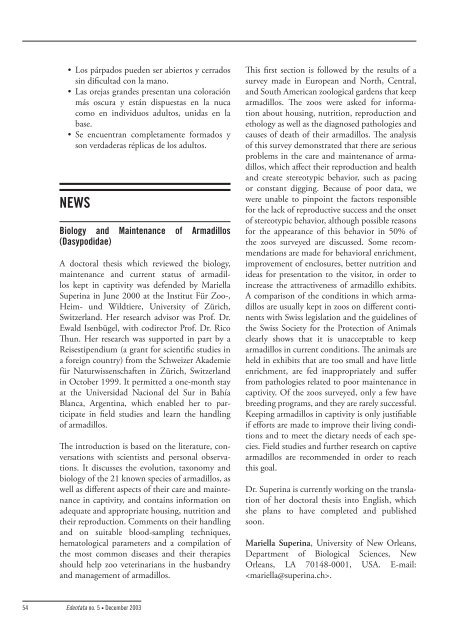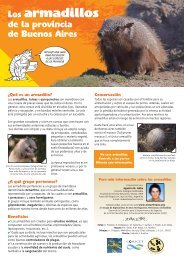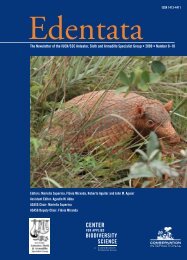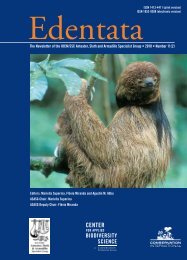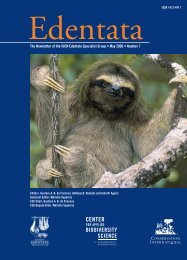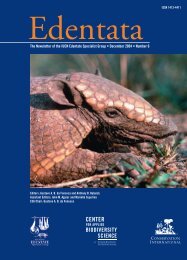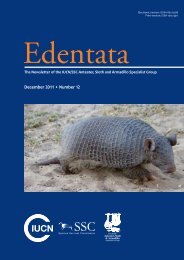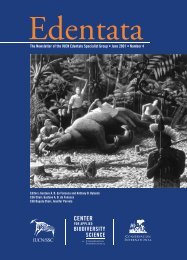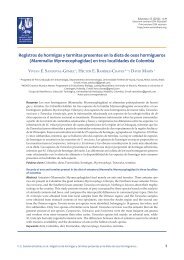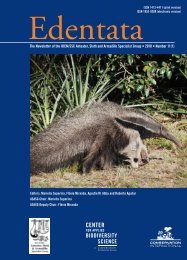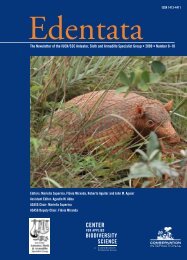• Los párpados pueden ser abiertos y cerradossin dificultad con la mano.• Las orejas grandes presentan una coloraciónmás oscura y están dispuestas en la nucacomo en individuos adultos, unidas en labase.• Se encuentran completamente formados yson verdaderas réplicas de los adultos.NEWSBiology and Maintenance of <strong>Armadillo</strong>s(Dasypodidae)A doctoral thesis which reviewed the biology,maintenance and current status of armadilloskept in captivity was defended by MariellaSuperina in June 2000 at the Institut Für Zoo-,Heim- und Wildtiere, University of Zürich,Switzerland. Her research advisor was Prof. Dr.Ewald Isenbügel, with codirector Prof. Dr. Ricoun. Her research was supported in part by aReisestipendium (a grant for scientific studies ina foreign country) from the Schweizer Akademiefür Naturwissenschaften in Zürich, Switzerlandin October 1999. It permitted a one-month stayat the Universidad Nacional del Sur in BahíaBlanca, Argentina, which enabled her to participatein field studies and learn the handlingof armadillos.e introduction is based on the literature, conversationswith scientists and personal observations.It discusses the evolution, taxonomy andbiology of the 21 known species of armadillos, aswell as different aspects of their care and maintenancein captivity, and contains information onadequate and appropriate housing, nutrition andtheir reproduction. Comments on their handlingand on suitable blood-sampling techniques,hematological parameters and a compilation ofthe most common diseases and their therapiesshould help zoo veterinarians in the husbandryand management of armadillos.is first section is followed by the results of asurvey made in European and North, Central,and South American zoological gardens that keeparmadillos. e zoos were asked for informationabout housing, nutrition, reproduction andethology as well as the diagnosed pathologies andcauses of death of their armadillos. e analysisof this survey demonstrated that there are seriousproblems in the care and maintenance of armadillos,which affect their reproduction and healthand create stereotypic behavior, such as pacingor constant digging. Because of poor data, wewere unable to pinpoint the factors responsiblefor the lack of reproductive success and the onsetof stereotypic behavior, although possible reasonsfor the appearance of this behavior in 50% ofthe zoos surveyed are discussed. Some recommendationsare made for behavioral enrichment,improvement of enclosures, better nutrition andideas for presentation to the visitor, in order toincrease the attractiveness of armadillo exhibits.A comparison of the conditions in which armadillosare usually kept in zoos on different continentswith Swiss legislation and the guidelines ofthe Swiss Society for the Protection of Animalsclearly shows that it is unacceptable to keeparmadillos in current conditions. e animals areheld in exhibits that are too small and have littleenrichment, are fed inappropriately and sufferfrom pathologies related to poor maintenance incaptivity. Of the zoos surveyed, only a few havebreeding programs, and they are rarely successful.Keeping armadillos in captivity is only justifiableif efforts are made to improve their living conditionsand to meet the dietary needs of each species.Field studies and further research on captivearmadillos are recommended in order to reachthis goal.Dr. Superina is currently working on the translationof her doctoral thesis into English, whichshe plans to have completed and publishedsoon.Mariella Superina, University of New Orleans,Department of Biological Sciences, NewOrleans, LA 70148-0001, USA. E-mail:.54 <strong>Edentata</strong> no. 5 • December 2003
ReferenceSuperina, M. 2000. Biologie und Haltung vonGürteltieren (Dasypodidae). Doctoral thesis,Institut Für Zoo-, Heim- und Wildtiere, UniversitätZürich, Zürich, Switzerland. 250pp.Giant <strong>Anteater</strong> (Myrmecophaga tridactyla)Beehive Foraging at Emas National Park,Brazile largest species of anteater in the world,Myrmecophaga tridactyla, is widely dispersedthroughout Central and South America, livingin varied habitats, including forests and opengrassland. e Emas National Park (ENP), about133,000 ha and mostly savanna, is one of themost important reserves of the Cerrado, and islocated in the southwest of the state of Goiás,bordering the states of Mato Grosso and MatoGrosso do Sul.In the late afternoon of 1 February, 2003, we werefollowing two giant anteaters to capture one ofthem to attach a radio-transmitter (the other wasalready equipped) in a grassland area of the ENP.Following the capture and near the capture site,we observed and photographed marks producedby an anteater’s claws, alongside a nearly circularburrow (20 cm diameter) in a termite moundabout 1.5 m high. Inside this burrow, were foundbees, honey, beehive wall, and the remains of arecently destroyed small Apis mellifera colony.We found a bee in the fur of the captured anteaterand a small swarm hovered around it, suggestingthat this animal may have attacked the beehive toeat the insects and/or the honey or other items.<strong>Anteater</strong>s have rarely been recorded attacking bees’nests (Cabrera and Yepes, 1940). Bee products arerich in nutrients and the association of a beehivewith the termite mound, commonly foraged byanteaters, could facilitate the encounter, resultingin the consumption of bees and their products. Inspite of similar problems associated with ants andtermites (low nutritional value of the prey, smallprey size and forms of defense relying on the socialityof the prey) (Redford and Dorea, 1984), beesmay be a suitable food source for giant anteaters(Redford, 1986).Acknowledgements: Fundação O Boticário de Proteçãoà Natureza / MacArthur Foundation, eWhitley Laing Foundation / Rufford Small Grants,Centro Nacional de Pesquisas para Conservaçãode Predadores Naturais – CENAP / IBAMA andInstituto Conservation International do Brasilsupported the Project “Ecology and Conservationof the Giant <strong>Anteater</strong> in Emas National Park.”Guilherme Henrique Braga de Miranda, InstitutoNacional de Criminalística / Departamentode Polícia Federal and Programa de Pós-graduaçãoem Ecologia, Instituto de Ciências Biológicas,Universidade de Brasília, 70.910-900 Brasília,DF, Brazil. E-mail: .Flávio Henrique Guimarães Rodrigues, Associaçãopara Conservação dos Carnívoros Neotropicais– Pró-Carnívoros and Departamento de Zoologia,Instituto de Ciências Biológicas, Universidade deBrasília, 70.910-900 Brasília, DF, Brazil. E-mail:.Ísis Meri Medri, Fundação Pantanal Com-Ciência, Av. Rio Branco 1270, UniversidadeFederal de Mato Grosso do Sul, 79304-020Corumbá, Mato Grosso do Sul, Brazil. E-mail:.Fernanda Vinci dos Santos, SHIN QI 7, Conjunto12, Casa 18, 71515-120 Brasília, DF,Brazil. E-mail: .ReferencesCabrera, A. and Yepes, J. 1940. Mamíferos Sud-Americanos. Historia Natural Ediar, CompañíaArgentina de Editores, Buenos Aires.Redford, K. H. 1986. Dietary specialization andvariation in two mammalian myrmecophages(variation in mammalian myrmecophagy).Revta. Chilena Hist. Nat. 59: 201-208.Redford, K. H. and Dorea, J. G. 1984. e nutritionalvalue of invertebrates with emphasison ants and termites as food for mammals.J. Zool., Lond. 203: 385-395.55
- Page 1 and 2:
EdentataThe Newsletter of the IUCN
- Page 3 and 4:
ARTICLESA Localidade Tipo da Pregui
- Page 5 and 6: quetas originais que acompanhavam o
- Page 7 and 8: Tolypeutes tricinctus (Linnaeus, 17
- Page 9: Figure 2 displays of all the known
- Page 12 and 13: FIGURE 5B. Medical Problems, contin
- Page 14 and 15: Eater is high in cellulose, which m
- Page 16 and 17: Symptoms: Loss of appetite - depend
- Page 18 and 19: eported. Low environmental temperat
- Page 20 and 21: TABLE 1. Weight loss and its causes
- Page 22 and 23: collections. Lastly, we want to ack
- Page 24 and 25: FIGURE 3. Dietary supplements used.
- Page 28 and 29: FIGURA 1. Incremento de peso de Jun
- Page 30 and 31: comparar sus medidas y pesos con un
- Page 32 and 33: Em ambos os locais, há poucos cupi
- Page 34 and 35: TABELA 2. Espécies de formigas for
- Page 36 and 37: L. R. Leite (eds.), pp.33-40. Funda
- Page 38 and 39: actividad. No fue posible realizar
- Page 40 and 41: of attaching a transmitter to an an
- Page 42 and 43: Authority (Coordenação de Aperfei
- Page 44 and 45: Automatic CamTrakker phototrap phot
- Page 46 and 47: ReferencesEisenberg, J. F. and Redf
- Page 48 and 49: Montgomery, G. G. 1985b. Movements,
- Page 50 and 51: noviembre y diciembre. Se estima qu
- Page 52 and 53: TABLA 1. Medidas biométricas y pes
- Page 54 and 55: a que esta especie después del apa
- Page 58 and 59: Official List of Brazilian Fauna Th
- Page 60 and 61: most severe for armadillos, which a
- Page 62 and 63: addition, Izoceño hunters have pro
- Page 64 and 65: and support for conservation effort
- Page 66 and 67: since 1992. Unfortunately, that stu
- Page 68 and 69: the first step in developing a rese
- Page 70 and 71: available on the Roger Williams Par
- Page 72 and 73: See for more details. From:IUCN Sp
- Page 74 and 75: tion. e IUCN 2000 criteria are used
- Page 76 and 77: Diversidad y Conservación de los M
- Page 78 and 79: techniques used for the preparation
- Page 80 and 81: Corredor Central da Mata Atlântica
- Page 82 and 83: McDonald, H. G. 2002. Fossil Xenart
- Page 84: or contact SherylFink at .Associati
- Page 87 and 88: NOTES TO CONTRIBUTORSScopeEdentata,


